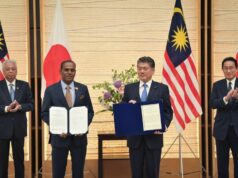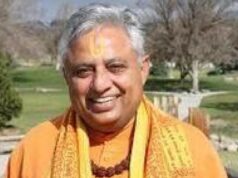Washington – Japanese Prime Minister Shinzo Abe and US President Barack Obama on Tuesday will make a “historic” visit to Pearl Harbor, the Hawaiian naval base where Japan attacked the United States, prompting its entry into World War II.
The visit will highlight how far the two allies have come more than seven decades after the war and provides a symbolic counterpart to Obama’s visit to Hiroshima in May, the US and Japanese governments said. The leaders will visit the USS Arizona Memorial, a sweeping white structure suspended over the sunken remains of a ship destroyed during the battle.
The December 7, 1941 surprise attack killed 2,403 Americans and left the US Pacific Fleet in ruins. President Franklin Roosevelt called it a “date which will live in infamy” in a speech to Congress the next day, and the US entered a war that would last another four-and-a-half years with fronts in the Pacific and Europe.
 Archive photo of burning US battleship on 7 December 1941, the day Japan attacked the US naval base of Pearl Harbor in Hawaii. Photo: dpa
Archive photo of burning US battleship on 7 December 1941, the day Japan attacked the US naval base of Pearl Harbor in Hawaii. Photo: dpa
Though the visit will not be the first by a Japanese leader to the site, it will be the most prominent, as Abe arrives alongside Obama to pay tribute to those killed in the war between their nations. “We must never repeat the horrors of war. Looking to the future, I want to demonstrate that resolve to the world,” Abe told reporters earlier this month.
Obama in May became the first US president to visit Hiroshima, where US forces dropped a nuclear bomb at the end of the war, and Abe’s visit had initially been reported as the first by a Japanese leader to the US site. In fact, premier Shigeru Yoshida made a low-key visit to the site in 1951, the Japanese government confirmed earlier this month.
Two other prime ministers also visited during the 1950s, according to photos published in a local Hawaiian Japanese-language newspaper and reported by Japanese media. The previous Japanese prime ministers made low-profile visits to the site, but wounds between the countries were still raw at that time and this visit 75 years later shows just how far the allies have come.
“It will provide them an opportunity to pay their respects to those who were killed on December 7, 1941, while also highlighting the power of reconciliation that has moved the United States and Japan from adversaries to the closest of allies,” said Daniel Kritenbrink, an advisor to Obama on Asia policy.
“The visit to Pearl Harbor will mark just how far we have come in our alliance with Japan not just since World War II, but also over the course of the Obama administration.” The Pearl Harbor visit was decided upon by the leaders on the sidelines of the APEC summit in Peru in November and was not directly tied to the Hiroshima visit, but would prove equally symbolic, Kritenbrink said.
In Hiroshima, Obama did not offer an apology for US actions, but did speak broadly of the need to prevent the spread of nuclear weapons.
Obama and Abe will hold a bilateral meeting before touring the USS Arizona Memorial and then making remarks to an audience of US, local and military officials that will also likely include veterans and survivors of the attack, Kritenbrink said.
The meeting between the leaders will look back at progress in the US-Japanese relationship during Obama’s tenure, including on defence cooperation and trade. Obama had sought to rebalance US foreign policy with a greater emphasis on Asia, but the election of Republican Donald Trump has cast questions about what role the US will play in the region moving forward.
Trump has said he will withdraw the US from the Trans Pacific Partnership trade deal between the US and 11 other nations that Obama had pushed. However the Trump has already met with Abe and the men are due to meet again shortly after Trump’s January 20 inauguration.
Abe told reporters after the meeting in November that the leaders would be able to “build a personal relationship of trust.” Trump sparked concern in Tokyo when he repeatedly said that Japan, which hosts several US military bases, should pay more for its protection, especially amid rising nuclear threats from North Korea and growing Chinese military might.
The bombastic billionaire also suggested that Japan may want to pursue the acquisition of nuclear weapons, a deeply sensitive issue in Japan, which is the only country to have suffered a nuclear attack.
–dpa










